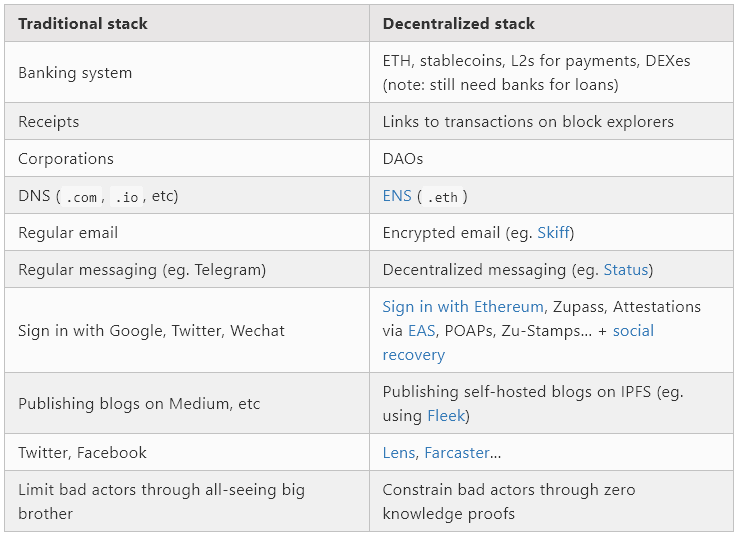Vitalik wants Ethereum to be more ‘Cypherpunk’ hailing the social layer as its core USP
Ethereum’s co-founder Vitalik Buterin shared his insights on the evolving landscape of the crypto ecosystem on Dec. 29, mainly focusing on Ethereum’s role in shaping a more open and decentralized internet in a blog post entitled “Make Ethereum Cypherpunk Again.”
Since its inception, Ethereum has journeyed beyond being a mere extension of Bitcoin with smart contracts. Buterin recalls early memories of using Bitcoin in Berlin’s Bitcoin Kiez and at PorcFest, a libertarian gathering, highlighting the intertwined nature of technological and social aspects in the crypto world. These experiences stress the broader vision of crypto: fostering a free, open society where technology, social, and economic elements harmoniously interact.
The initial concept of “web3,” as coined by Ethereum’s co-founder Gavin Wood, envisioned Ethereum as a fundamental component of a more open internet stack. This vision aimed to overcome the limitations of the free, open-source software movement of the 1980s and ’90s, which did not account for modern internet applications’ collaborative and centralized nature. Ethereum, along with technologies like peer-to-peer messaging and decentralized file storage, was seen as a decentralized, shared hard drive crucial for extending the spirit of open source into today’s interconnected world. For Buterin, the chart below outlines the core benefits of decentralized technologies.

However, Buterin notes a shift in focus since around 2017, with a diminished emphasis on consumer crypto payments and non-financial applications. This shift is partly attributed to rising transaction fees on the Ethereum network, which have priced out more minor, non-financial uses in favor of financial applications dominated by speculative activities. According to Buterin, this change has led to a misalignment with the original vision of Ethereum and the broader crypto space.
Looking ahead to 2024, Buterin highlights several positive developments in Ethereum’s technology that could steer the platform back toward its foundational principles. These include advancements in rollups, second-generation privacy solutions, account abstraction, light clients, and zero-knowledge proofs. These technologies address the challenge of scalability and embody the values of decentralization, censorship resistance, and open participation.
As part of a broader technological vision, Buterin states, Ethereum continues developing its original components and “sister technologies” such as decentralized messaging and decentralized storage. Introducing zero-knowledge proofs adds a new dimension, enabling privacy and authentication simultaneously. For instance, Buterin notes how Zupass, a zero-knowledge-proof-based system, successfully implemented anonymous voting, demonstrating the potential of Ethereum-based technologies in achieving privacy without sacrificing security.
“We can start to see the contours of what an Ethereum-y cypherpunk world would look like, at least on a pure technical level.
We can be holding our assets in ETH and ERC20 tokens, as well as all kinds of NFTs, and use privacy systems based on stealth addresses and Privacy Pools technology to preserve our privacy while at the same time locking out known bad actors’ ability to benefit from the same anonymity set.”
Buterin also emphasizes Ethereum’s role in developing a decentralized tech protocol stack, competing with traditional centralized systems. This stack includes banking, social media, and identity verification alternatives, highlighting Ethereum’s commitment to building tools that interoperate with a broader ecosystem rather than creating isolated empires.
The social layer of Ethereum is equally crucial, according to Buterin. He acknowledges the need for a balance between incentive-driven and community-oriented approaches. Large-scale public goods funding and cooperative efforts within the Ethereum ecosystem are steps toward this balance, yet there is much room for growth and improvement.
“There is a unqiue mix of valuing a warm and cohesive community, but at the same time remembering that what feels “warm and cohesive” from the inside can easily feel “oppressive and exclusive” from the outside, and valuing hard norms of neutrality, open source and censorship resistance as a way of guarding against the risks of going too far in being community-driven.”
Ultimately, Buterin envisions Ethereum as a platform that excels technically and economically and fosters a robust and value-driven community. Buterin closes his post by stating,
“If this mix can be made to work well, it will in turn be in the best possible position to realize its vision on the economic and technical level.”
Buterin believes integrating technical innovation with social and ethical principles could potentially lead Ethereum to realize its original vision of a decentralized, open, and equitable digital world.


